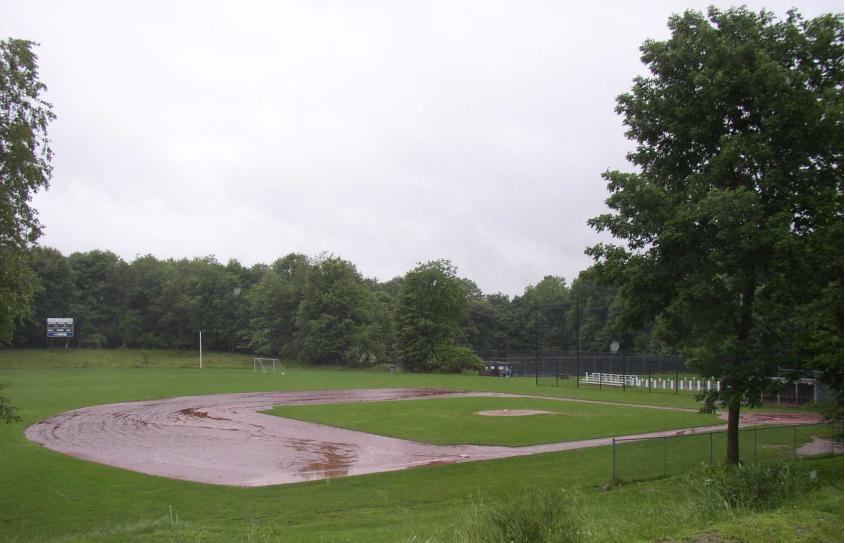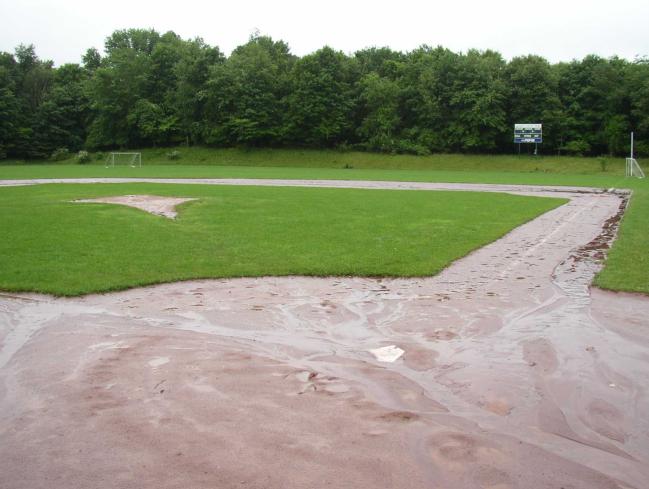Announcement
Who’ll Stop the Rainout? Certainly Not the Opposing Team
As if it not tough enough to convince our loved ones to let us waste half a day playing baseball, now we waste a half of day not playing baseball. That’s thanks to the insensitivity of the opposing team on June 22, 2003 as the double-header was both flooded and rained out. There was plenty of controversy amid the inclemency.
The Tri-State Yankees refused to call off the games that morning despite the flash-flood warnings from 4 p.m. the previous day to 7 a.m. that morning and the forecast of heavy rain. They claimed that their home field, Fox Valley Park in Goldens Bridge, was dry at 7:15 a.m. Tri-State Manager Bruce Filger said “we are a go” since the field drains well.
Yet when the 11 Clippers arrived at the field from destinations at least 90 minutes away starting at 8:45 a.m., the infield was a quagmire full of rivers, and the outfield was a pond. The Clips have serious doubts about whether the field was playable before that time. The rain that fell in the hour and half before their arrival was not heavy enough to make the field better for a swim meet than a baseball game.
“The Yankees actions were not only inconsiderate but irresponsible and inexcusable,” said Clippers player-manager Tom Dixon. “In my 16 years of adult baseball, I find it hard to believe that the field got this bad in an hour and a half. My players are outraged at the insensitivity. But at least they are dedicated about playing ball, no matter the conditions. The opposing team seemed more interested in getting a forfeit than settling things on the field another day.”
After the game was called, Figler was less than apologetic. “That’s the risk you take,” Figler told the angry and suspicious Clipper players, adding that he was unaware they traveled great distances despite being told numerous times by Dixon in the previous two days. “What can you do? We tried.”
Ironically, Tom spent several hours during the week trying to get the Yankees another field even though he was the road team. The Yankees could only get theirs for a single game due to soccer makeup games. But Blue Mountain Middle School was an ocean on Saturday night. So the managers agreed to a single 9-inning game at Fox Valley starting at 10 a.m. despite the deluge all day Saturday and Saturday nights as well as flash-flood warnings extending into Sunday afternoon.
Figler promised a ruling by 7:15 a.m., and Dixon rallied his troops Saturday night and Sunday morning despite a rain storm on the ride up that morning and players making treks from Long Island, Connecticut, Manhattan, the Bronx and Westchester County. These dedicated players wasted no time and got the chance to watch rain fall on a flooded field.
When the Yankees manager finally arrived at 9:15 a.m., he expressed surprise about the field and foolishly felt that it was in good shape. “You can still run on the field,” he said while sloshing through mud and puddles along the first base line. “If we rake the infield, it will dry in 30 minutes even though it’s raining.”
Needless to say, the irate umpires disagreed. One of the two had taken the Metro-North train from New York City to the game. The $25 travel fee (vs. the regular $80 for a single and $130 for a double-header) barely covers train fare or gas costs. The two umps deemed the field unplayable and agreed with Tom that it was unsafe and that someone could get hurt. After all, the Clippers failed to bring their Scuba gear or L.L. Bean boots.
Yet Figler, who had not checked the field himself and instead let a teammate do so, seemed oblivious to the absurdity of his behavior. “The field was fine an hour ago. It was not raining where I live.” Where was that, one upset Clipper asked? Florida. “You’re full of s---,” another said.
As the Clippers kept their composure, members of the Yankees were expressing their anger about their own manager. For some reason, Figler had been adamant about not checking the field the night before or allowing the visitors to help do so that night or that morning. After all, he said, it’s the home team’s call on whether to play the game the next morning. If the opposing team fails to show up regardless if there’s a monsoon, they forefeit, he reminded Tom.
The Clips got a measure of revenge by sweeping both 9-inning make-up games. The first was an 8-4 victory under the lights during a midweek game on Aug. 13, 2003 at Veteran’s Memorial Park in Orangeburg. The Clips then knocked off the Yanks 11-8 on Saturday, Aug. 23 in the first of three victories that weekend at Horace Greeley High School in Chappaqua. Those wins put the Clips in the upper-division playoffs for the first time in team history. Then the seventh-seeded Clips upset the second place Somers Orioles. (See Clippers Classics for details.)
Needless to say, Tom pushed for a modification of the rainout rule in the off-season, along with the formation of a league Board of Directors and Rules Committee to deal with such actions. Or at least the institution of some common sense, decency and sanity regarding such situations. The league changed the rule to allow the road team to check the field conditions the day before and morning of the game and offer input, although the home team continues to make the ruling on the status of the game until the umps arrive. “I would never do this to anyone, friend or foe,” Tom said. “This league is supposed to about fun and recreation. Not trying to steal wins or make the life of your opponent miserable.”
He added, “Most leagues would bring these guys before the Rules Committee and punish them for this type of ridiculous behavior. But our league does not have a Rules Committee. That has to change. Teams and players must be held responsible for their actions.”
